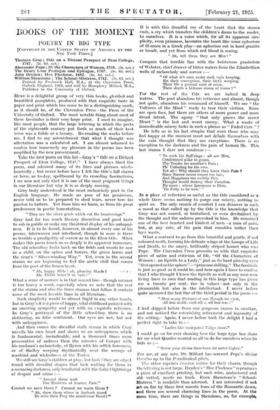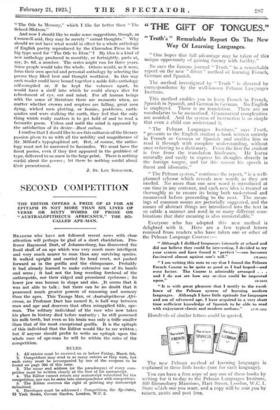BOOKS OF THE MOMENT
POETRY IN BIG TYPE
'COPYRIGHT IN THE UNITED STATES OF AMERICA BY THE
New York Times.]
Thomas Gray ; Ode on a Distant Prospect of Eton College, 1747. (3s. 6d. net.) William Shenstone a The School-Mistress .1742. (5s. 6d. net.) Printed by Frederick Hall, M.A., at ;he Clarendon Press, Oxford, England, 1924, and sold by Humphrey Milford, M.A., Publisher to the University of Oxford.
HERE is a delightful group of very thin books, glorified and beautified pamphlets, produced with that exquisite taste in paper and print which has come to be a distinguishing mark, as it should be, of the Clarendon Press—the Press of the University of Oxford. The most notable thing about most of these facsimiles is their very large print. I used to imagine, like most people, that the large lettering in which the poets of the eighteenth century put forth so much of their best verse was a foible or a luxury. Re-reading the works before me, I find to my astonishment that what I thought was affectation was a calculated art. I am almost ashamed to confess how immensely my pleasure in the poems has been amplified by the new presentment.
Take the first poem on this list—Gray's " Ode on a Distant Prospect of Eton College, 1747." I have always liked the poem, and admired many of its lines and phrases whole- heartedly ; but never before have I felt the Ode's full charm or been, as to-day, spellbound by its crowding fascinations, I see now not only that it is one of the most poignant things in our literature but why it is so deeply moving.
Gray truly understood is the most melancholy poet in the English language. He made no pose of his pessimism, never told us to be prepared to shed tears, never tore his passion to tatters. Yet from him we learn, as from his great predecessor in poetic lamentation,
" They are the silent griefs which cut the heartstrings." Gray had far too much literary discretion and good taste to sob in public or make any theatrical display of his unhappi- ness. It is to be found, however, in almost every one of his poems, interwoven and interlaced, though in none is there so terrible a prodigality of sorrow as in the Eton Ode. What makes this poem touch us so deeply is its apparent innocence. The old schoolboy looks back on the fields and woods he saw as a child, on the spires and towers, the green lawns and the river's " Silver-winding Way." Yet, even in the second stanza we are beginning to feel the arctic chill that comes from the poet of the frozen heart.
" Ah, happy Hills ! ah, pleasing Shade ! --, l■ Ah, Fields belov'd in vain!'
What a sense of menace is in that second line—though menace is too heavy a word, especially when we note that the rest of the stanza and also the three stanzas that follow it contain some of the most lovable lines in all literature.
Such simplicity would be almost frigid in any other hands, but in Gray's it is a piece of happy, vital childhood painted with an unerring sympathy and yet with an exquisite reticence. In Gray's portrayal of the little school-boy there is no slobbering, no false sentiment. Our eyes are wet, but not with unhappiness.
And then comes the dreadful sixth stanza in which Gray unveils his own heart and shows us an unhappiness which is fundamental, ineradicable, and a thousand times more provocative of sadness than the miseries of Cowper with his madman's melancholy, of Byron with his selfish fierceness, or of Shelley weeping rhythmically over the wrongs of mankind and wickedness of the Tories.
We still see Gray's children at play, but look ! they are edged round with dreadful shapes that lurk waiting for them in a menacing darkness, only irradiated with the forked lightnings of despair and crime :-
"Around them wait
The Ministers of human Fate."
Cannot we save them ? Cannot we warn them ?
" Ah, show them where in Ambush stand To seize their Prey the murderous Band
It is with this dreadful cry of the heart that the stanza, ends, a cry which transfers the children's doom to the reader,
to ourselves. It is a voice which, for all its apparent sim- plicity, even primness, lacerates the heart like some aphorism of ill-omen in a Greek play—an aphorism cut in hard granite or basalt, and yet from which red blood is oozing.
" Ah, tell them they are Men ! "
Compare that terrible line with the boisterous pessimism
of Webster, chief drawer of bitter waters from the Elizabethan wells of melancholy and sorrow :—
" Of what is't men make such vain keeping, Sin their conception, their birth weeping, Their life a general mist of error,
Their death a hideous storm of terror ? "
For the rest of the Ode we are indeed in deep waters. The poet abandons his reticence and almost, though not quite, abandons his command of himself. We see " the Vultures of the Mind " ready to tear their victims. Some are open foes, but there are others of more power and more dread intent. The agony " that only gnaws the secret Heart " is the last and worst enemy. What a waste of immedicable misery lurks in such a phrase as " Faded Care " !'
He tells us in his last strophe that even those who may feel happy at the moment must not delude themselves with the vain thought that they are exceptions. There is no exception to the darkness and the pain of human lfe. This last stanza I dare not condense :-
" To each his Sufrrings : all are Men,
Condemned alike to groan, The Tender for another's Pain ; Th' Unfeeling for his own.
Yet ah ! Why should they know their Fate ?
Since Sorrow never comes too late, And Happiness too swiftly flies. Thought would destroy their Paradise. No more ; where Ignorance is Bliss, 'Tis Folly to be wise.' "
In a piece of reflection so awful as the Ode considered as a.
whole there seems nothing to purge our misery, nothing to quiet us. The only crumb of comfort I can discover in such a mood as that called up by the Ode is the knowledge that Gray was not soured, or brutalized, or even devitalized by; the thought and the sadness provoked in him. He remained one of the best hearted and kindest of men—a man of pain, but, at any rate, of the pain that ennobles rather than lays waste.
What a contrast to go from this beautiful and gentle, if sad coloured moth, burning his delicate wings at the Lamps of Life and Death, to the angry, brilliantly striped hornet who was. Pope. The Clarendon Press presents us with that exquisite piece of satire and criticism of life, "Of the Characters of
Women : an Epistle to a Lady," just as its hard piercing eyes, "first opened onthe sphere"—"price one shilling." The facsimile is just as good as it could be, and here again I have to confess that I who thought I knew the Epistle as well as any man now living have to own that reading in this large type has given me a twenty per cent. rise in values—not only in the pleasurable but also in the intellectual. I never before quite savoured the last line of the third period in the poem :-
" How many Pictures of one Nymph we view, All how iirtlik.3 each oilvr, all how trust" I had skipped before from one gorgeous cameo to another, and not noticed the astonishing refinement and ingenuity of the setting.a Again, I never before took the delight I had a perfect right to take in :- "Ladies like variegated Tulips show."
I could go on for ever showing how the large type has done
for me what Quarles wanted us all to do for ourselves when he bids us :- "Screw your divine theorboes six notes higher."
For me, at any rate, Mr. Milford has screwed Pope's divine
theorbo up to the Paradisaical pitch.
The other reprints deserve notice for their charm, though the lettering is not large. Dryden's "Mac Fleelowe " reproduces a piece of excellent printing, but such wine, undoctored and old vatted, needs no bush. Even Shenstone's " School- Mistress " is readable thus adorned. I am interested if not met on fire by these first roseate hues of the Romantic dawn, and there are. several charming lines in the poem. At the same time, there are things• in Shenstone, as, for emampla,
" The Ode to Memory," which I like far better than " The School-Mistress."
And now I should like to make some suggestions, though, as Cromwell said, they may be merely " carnal thoughts." Why should we not have what would in effect be a whole anthology of English poetry reproduced by the Clarendon Press in the big type used for "The Ode to Eton" ? My idea is a kind of new anthology produced in monthly, or fortnightly, parts at, say, 2s. 6d. a number. The series might run for three years. Some people would take the whole. Others would, as it were, form their own special and personal anthology by selecting the poems they liked best and thought worthiest. In this way each reader could have bound together a noble folio anthology self-compiled or, if he kept the volumes apart, he would have a shelf into which he could always dive for refreshment of eye, ear and mind. For all human beings with the sense of literature there are moments when, no matter whether crowns and sceptres are falling, great men dying, wicked men plotting, or famine, pestilence, earth- quakes and wars stalking the earth, they feel that the only thing which really matters is to get hold of and to read a favourite poem. Unless and until the mind is appeased by the satisfaction of its desire—Ruat coelum.
I confess that I should like to see this catharsis of the literary passion given to us with all the nobility and magnificence of Mr. Milford's typographical art. But, of course, the antho- logy must not be narrowed to facsimiles. We must have the finest poems, even if they first appeared in the grubbiest of type, delivered to us anew in the large print. There is nothing sordid about the poems ; let there .be nothing sordid about their presentment.
J. ST. Lou STRACHEY.











































 Previous page
Previous page